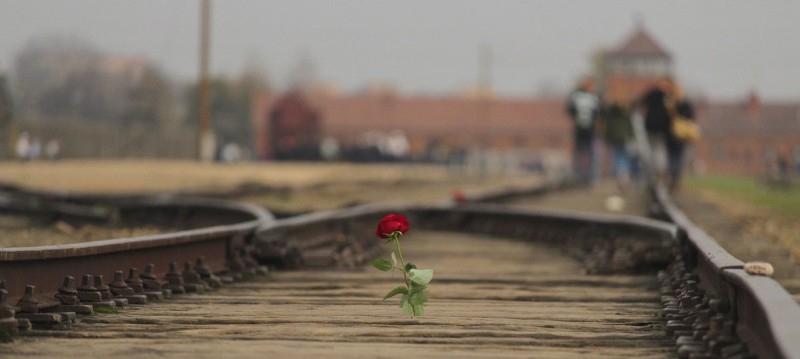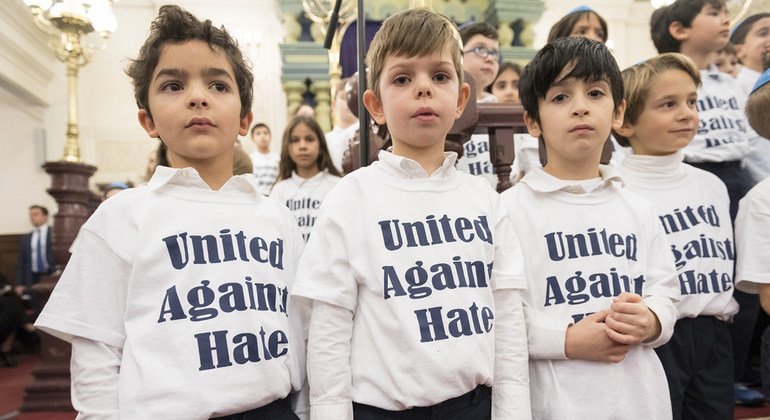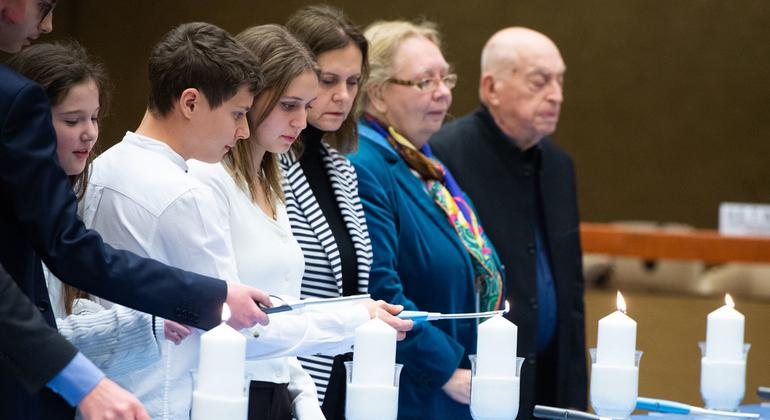
Unsplash/Albert Laurence A rose placed on the railway tracks at the Memorial and Museum Auschwitz-Birkenau, Poland.
“The Holocaust did not happen as a ‘lesson’ for humanity, but it did happen. And because it happened, it may happen again,” Mr. Guterres told the annual ceremony held at the historic Park East Synagogue in New York to commemorate the liberation of the Auschwitz concentration camp.
“We must never let down our guard. We must be forever vigilant,” he warned, because The painful truth is that even today, antisemitism is everywhere. If anything, it is increasing in intensity.”
Moreover, the same is true for other forms of racism and hate: Anti-Muslim bigotry; xenophobia; homophobia; and misogyny. Indeed, the UN chief explained that Neo-Nazi white supremacist movements today represent the number one internal insecurity threat in several countries – and the fastest growing.
“Their venom is moving from the margins to the mainstream,” said Mr. Guterres, citing their demonization of the other, disdain for diversity, denigration of democratic values, and disregard for human right, as “evils are not new to our time. What is new is their reach and their speed.”

UN Photo/Rick Bajornas
Stop the hate
The racist bigot who in the past might have spread his vitriol as far as his dinner table, today has a microphone with global reach, the Secretary-General said, adding that: “The paranoid conspiracy theorist who in the past might have found a single acquaintance to confide in, today finds a like-minded community of millions online.”
“The consequences are as troubling as they are dangerous,” he stressed, and recalled that on Friday during the UN General Assembly’s annual Holocaust Memorial Ceremony, he had launched an appeal to stop the hate and set up guardrails.
“I called out social media platforms, technology companies and advertisers for their complicity in amplifying vicious lies for profit. I called for regulation to clarify responsibilities. And I called on all of us to stand up and stand firm against hate. We must confront falsehoods with facts, ignorance with education, indifference with engagement,” he declared.
Religious leaders and governments must step up
Mr. Guterres went on to say that religious leaders everywhere had a duty to prevent the instrumentalization of hatred and defuse extremism amidst their followers. At the same time, governments everywhere have a responsibility to teach about the horrors of the Holocaust.
“The United Nations – including through our Holocaust Outreach Programme – is at the forefront of this crucial work. And as fewer and fewer can bear direct witness, “we will have to find new ways to carry the torch of remembrance forward. Within families and across generations. Within classrooms and across geographies. We must tell the stories of the persecuted.”
Those stories must include the mass murder of the Roma and Sinti; the torture and murder of other victims targeted by the Nazis: persons with disabilities; Germans of African descent; homosexuals; Soviet prisoners of war; and political dissenters and countless others.
“And above all, we must tell the stories of all the children, women, and men who were systematically murdered and who together made up the rich and vibrant mosaic that was Jewish life in Europe. We must remember the Holocaust not as the history of 6 million deaths; but as 6 million different stories of death,” Mr. Guterres said.

UN Photo/Violaine Martin
Honour the memory of those who perished
The Secretary-General said that our responsibility is to honour the memory of those who perished, “but also to learn the truth of what happened, and to ensure that neither we, nor future generations, ever forget. To refuse impunity for perpetrators anywhere. To stand against those who deny, distort, relativize, revise, or otherwise whitewash their own complicities or that of their fellow citizens.”
Quoting renowned scholar and diarist Victor Klemperer, Mr. Guterres said: ‘Curious: At the very moment modern technology annuls all frontiers and distances…, the most extreme nationalism is raging.’
While this passage was written in the 1930s, the UN chief noted that it has an eerie resonance today.
“Our response must be clear. We must strengthen our defenses and reject those who seek to deny the past to reshape the future. We must pledge – not simply to remember – but to speak out and to stand up. To speak out wherever we witness hate and to stand up for human rights and the dignity of all – today and for all days to come,” concluded the Secretary-General.

